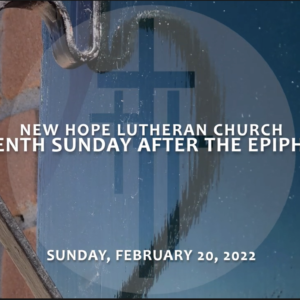Luke 6:27-38
[Jesus said:] 27 “But I say to you that listen, Love your enemies, do good to those who hate you,
28 bless those who curse you, pray for those who mistreat you. 29 If anyone strikes you on the cheek, offer the other also; and from anyone who takes away your coat do not withhold even your shirt. 30 Give to everyone who asks of you; and if anyone takes away your goods, do not ask for them again.
31 “Do to others as you would have them do to you? 32 If you love those who love you, what credit is that to you? For even sinners love those who love them. 33 If you do good to those who do good to you, what credit is that to you? For even sinners do the same. 34 If you lend to those from whom you hope to receive, what credit is that to you? Even sinners lend to sinners, in order to receive as much again. 35 But love your enemies, do good, and lend, expecting nothing in return. Your reward will be great, and you will be children of the Most High, who is kind to the ungrateful and the wicked. 36 Be merciful, just as God is merciful.
37 “Do not judge, and you will not be judged; do not condemn, and you will not be condemned. Forgive, and you will be forgiven; 38 give, and it will be given to you. A good measure, pressed down, shaken together, running over, will be put into your lap; for the measure you give will be the measure you get back.”
————————
Please pray with me this morning, church:
God of new and amazing things,
Sometimes we have difficulty seeing
The new thing you are calling us to.
Sometimes our inability to see
Comes from a lack of holy imagination.
Inspire us this morning.
Give us new eyes and new ears.
Give us a new spirit to dream a new thing with you.
Amen.
————————
Over at the Michaelis household, we’re not exactly garden people. We aspire to be, and we’re working on some plans to be, but look, I’ve talked before about my thumb and how it’s less green and more brown or black. We needed some space in our backyard along the fence and we recently had some trees removed and now we’ve got this wonderfully open space that gets a good bit of sun, perfect for some raised beds. And actually, Ollie and I put together a couple of raised beds yesterday. Like I said, we’ve got some plans in the works, so check back with me later to see how it’s all going.
The journey from seed to seedling to full blown plant is a long one. And if you’re like me, and extremely confident that at some point along the way you’re going to miss a step and really mess things up, it’s a journey fraught with a decent amount of anxiety and second-guessing, as well.
But when you stop to think about it, and you’re holding these seeds in your hand, and you look down at these little kernels of potential…I find it really difficult to conceivably imagine that this tiny, rigid casing could possibly become a cucumber, or a tomato, or a jalapeño, or a blueberry. The process seems so far outside my ability to imagine.
And yet…that’s precisely what happens. With a little good soil and some water and a healthy amount of sunlight, those little kernels germinate and sprout and grow and become something beautiful and wonderful, and in some cases, quite tasty. The process of growing something from seed to plant is to observe transformation in real time.
The whole idea behind transformation is that it’s something completely different. What it was before is not what it becomes, and in fact, is nothing like what it was before, it is wholly and fully and completely different.
When St. Paul is talking about the resurrection in our lesson from First Corinthians, he’s getting at this idea of transformation. “What about the resurrection of the dead? What does that look like? What kind of bodies will the resurrected have?” “Fools!” Paul says…“What you sow doesn’t come to life unless it dies…what is sown is perishable, what it raised is imperishable.” Paul is saying, “You’re asking about resurrection and bodies, and you’re missing the point entirely.” You’re asking the wrong question. The resurrection isn’t about what kind of bodies we’ll have. You’re wanting to know if you’ll have that limp in the resurrection. “Will I have that nagging arthritis? Will my knee still pop in that funny way when I stand up after the resurrection?” Or even more to the point…“Will I have cancer in the resurrection? Will I still have cataracts? Will my blindness, or my lameness, or my mental illness…will I still bear these sufferings in the resurrection?”
“Dear sweet child of God…that’s…the wrong question…” Paul replies.
Resurrection is transformation. What comes after is not anything like what came before. The resurrection isn’t about your body…the resurrection is something experienced apart from and outside of your physical body. It is wholly and fully and completely different.
Part of the difficulty with things like transformation is that we are, in many ways, constrained by what we see and what we know. We struggle to imagine something completely different because what was before might be all we’ve known. It’s difficult to imagine something wholly and fully and completely different that may not look like anything we’ve ever seen before.
But what if we allowed ourselves to dream? What if we challenged ourselves to imagine something outside of and beyond anything we’ve currently experienced? If you weren’t constrained by your experiences and conceptions of “the way things have looked” or “the way things have been done,” what new and amazing possibilities could you dream up?
This is the gift and challenge of transformation. Transformation exists beyond what we currently know and experience.
So in the gospel of Luke, as Jesus is continuing this morning with what we call the Sermon on the Plain, it’s like we talked about last week, the kingdom of God, the reign and dominion of God that Jesus is describing sets itself overagainst worldly kingdoms and empires, but it looks nothing like those worldly dominions either. The reign of God exists outside of the constraints and conceptions of the way empires are supposed to operate. Last week we heard that God’s vision of the world is one of leveling, where the powerful and the haves are brought low and the lowly, despised, outcast, and downtrodden are lifted up. This week, Jesus uses all these examples of how the world that we know operates, and flips them all on their head. “Love your enemies, and do good to those who hate you. Bless those who curse you, pray for those who mistreat you. If someone strikes you on the cheek, offer your other. If anyone takes away your coat, give them your shirt, too. Give to everyone who asks of you; and if anyone takes away your goods, do not ask for them back.”
Verse 31 is one of the most well known verses in all of Scripture. And interestingly, every single major world religion has some variation of this in their holy texts. On the Fort Bend Interfaith Council, of which New Hope is a member, we even have a subgroup of interfaith partners called the “Golden Rule Gang” and this group has taken under their specific charge seeking out ways to advocate for and be agents of tangible change in our community. Things like housing and food insecurity, rental and mortgage assistance, eviction cases, gun violence in schools… Advocacy…justice…protest…engaging elected officials… The Golden Rule Gang seeks out ways that our faith communities can add our voices to the public discourse to make real and lasting change for the betterment and health of our community.
But what’s interesting is that Jesus seems to take this idea even further. Some biblical scholars argue that verse 31 really belongs with the section below it, verses 32-34, and is really better posed as a rhetorical question. Hear it this way, the way I read it earlier: “Do to others as you would have them do to you? If you love those who love you, what credit is that to you? For even sinners love those who love them. If you do good to those who do good to you, what credit is that to you? For even sinners do the same. If you lend to those from whom you hope to receive, what credit is that to you? Even sinners lend to sinners, to receive as much again.”
“But love your enemies, do good, and lend, expecting nothing in return.”
Do more, Jesus is saying. St. Paul will echo this in Philippians: “Treat others as better than yourselves.”
Go beyond just what you would want for yourself. Be part of transformational change. Break the cycle of this for that, giving only to receive back as much. Live beyond the ways of being that are operative in the world. Be transformed and live transformed lives.
It’s not a way of living in the world that is this way or that way…it’s a way of discipleship that is completely separate from the way the world works. It’s a way of life that is completely different altogether.
“How is it a credit to you if you only like those who like you? If you only are good to someone because they were first good to you? If you only give to someone hoping that they’ll give it back to you someday?”
“Love your enemies. Do good. And give away, expecting nothing in return.”
It is a completely counter-cultural, counter-intuitive way of living. It’s unlike anything we could imagine or have experienced in our lives up to this point. It’s a pattern of life that exists outside of our ability to understand. It’s transformational.
When we dare to imagine or dream beyond what we’ve experienced, beyond our conceptions of the way things have always been or the way we’ve always done things, then we’re starting to dream about transformational ministry.
These are the questions put before us in our Capital Campaign, Building on Hope. What new thing is God calling New Hope to in this time? How can New Hope serve Missouri City, Stafford, Sugar Land, and Fort Bend County in a new way?
ESL classes? They’ve got full ones going on right now over at Armstrong. Do they need more space to hold classes?
Affordable after-school care? There’s a whole elementary school over there with kids whose parents are working two and three jobs to feed their babies and families.
Job training and flexible work space? There’s a whole new generation of entrepreneurs and business owners that have only known remote work untethered to an office, but it can be helpful to have a spot to crank out a few emails and gather together with other young professionals to bounce ideas off of.
Sports leagues. Meeting space. Cooking classes.
A Community Center.
We are truly only limited by our imagination.
This is how we are Building on Hope.
This is what you’re being invited into, church.
This is the transformational mission and ministry to which God is calling New Hope.
And this is the transformational work you’re being invited into by joining with us in Building on Hope.
Say yes to this invitation.
The work is long.
Tending a seed from kernel of incredible potential to germination to seedling to full blown plant requires patience, consistent watering, sunlight, and a healthy dose of love.
But oh, when it blossoms… Oh, when it blooms…
The transformation is so much more than our wildest imaginations.

